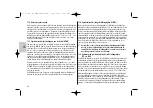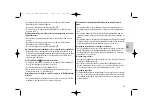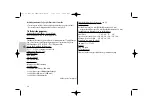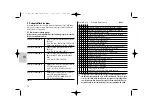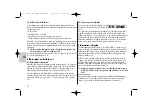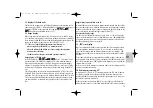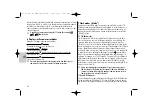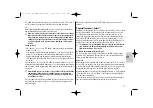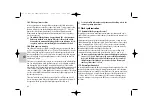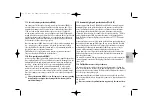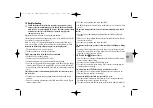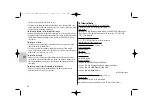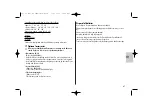
74
ķ
then the display of the flash unit will briefly indicate the underexposure in f-stops
ranging from -0.3 EV to -3.0 EV in one-third increments. In borderline instances
the flash unit will not display an „OK“, or the flash symbol will blink in the
camera viewfinder, even though the exposure is correct. In this instance, no indi-
cation will appear!
To enable underexposure warnings, the TTL mode (for example.
,
,
BL must be set!
6 Displays in the camera viewfinder
Examples of displays in the camera viewfinder:
A green arrow symbol lights up:
Command to switch on or use the flash unit.
A red arrow symbol lights up:
The flash unit is ready for firing.
A red arrow symbol remains lit up after the shot or goes out briefly:
The exposure was correct.
A red arrow symbol blinks after shooting:
The shot was underexposed.
For information applicable to the displays in the viewfinder of your
camera model, refer to the camera’s operating instructions.
☞
TTL
TTL
TTL
☞
7 Flash modes („Mode“)
Depending on the camera model or camera group (see Table 1), various TTL
flash modes and the manual flash mode are available. To set the flash mode, a
data exchange must therefore occur before the flash unit and camera, e.g. by
tapping the camera’s shutter release. Setting of the flash mode occurs with the
„Mode“
button.
7.1 TTL-flash modes
The TTL flash modes offer a very simple method of achieving very good flash
shots. In these modes, exposure readings are taken by a sensor built into the
camera, which measures the amount of light through the camera lens (TTL =
„Through The Lens“). Here the camera automatically determines the flash perfor-
mance required for a correct exposure of the shot. The advantage of the TTL flash
modes is that all factors influencing exposure (filters, change of aperture and
focal length with zoom objectives, extensions for close-ups, etc.) are automatical-
ly taken into account in adjusting the flash light. The symbol appears depen-
ding on the camera model and means that preflash measuring technology is in
operation, for example, in i-TTL, D-TTL and 3D. The symbol „BL“ (BL = balanced
light) indicates that the distance data of the lens (for example, 3D function) were
taken into account in the flash exposure and/or that a fill-in flash is involved.
If the shot was correctly lit, the correct exposure indication
will flash „OK“ for
about 5 seconds (see 4.2).
Please note whether there are limitations for your camera in terms of
film sensitivity for TTL flash mode (for example, ISO 64 to ISO 1000; see
camera’s operating instructions)! In analogue cameras there must be a
film in the camera to test the TTL function!
i-TTL and D-TTL flash mode
The i-TTL flash mode is supported by cameras of Group E, the D-TTL flash mode
by cameras of Group D (see Table 1). i-TTL and D-TTL flash modes are advan-
ced variants of the normal TTL flash modes used with analogue cameras. Before
☞
707 47 0081.A2 48AF-1Nikon/Inh. 19.09.2007 12:42 Uhr Seite 74



